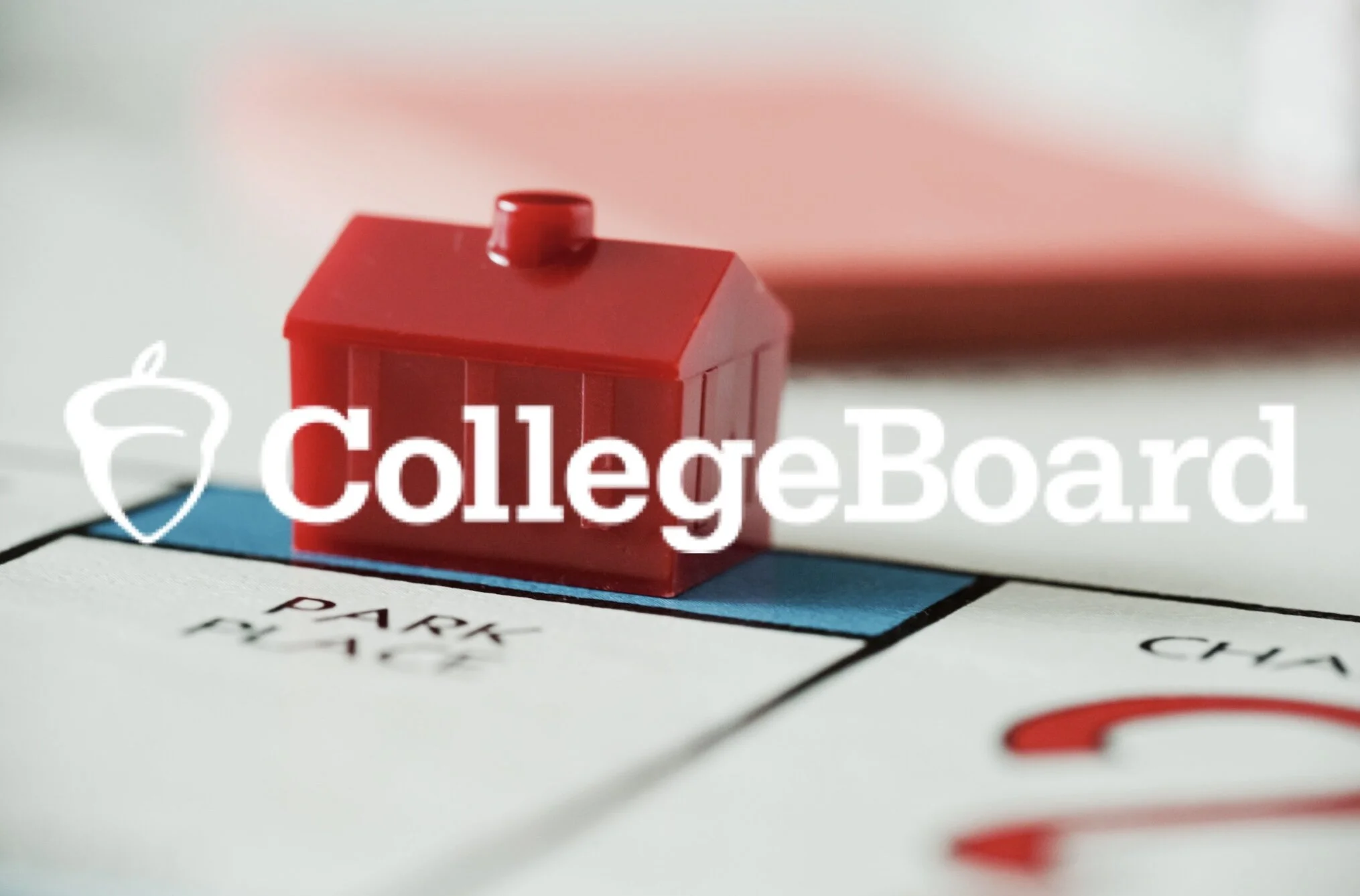The Monopoly on Education
Design by Cora Kuhlenbeck made with Canva
Sarah Kidd
The College Board has successfully monopolized and monetized the college admissions process for high school students, and something needs to be done about it. The college application process is already stressful enough, and the monopoly that College Board has doesn’t make it any easier (or cheaper). For high school students seeking higher education, it is almost impossible to escape the grasp of College Board’s tests and exams. After all, their exams boast a chance of showing that you are “smarter” than your peers in various subjects, which may benefit your application chances overall. But at what cost? The way this system is currently set up is extremely exploitative, as it capitalizes and profits off of the stress and anxiety of teenagers and their parents. Not only that, but College Board has complete control over the process. With no competition or incentive to make their tests more student-friendly, College Board exams have become glaringly more focused on profit margins rather than truly helping students to pursue dreams of higher education.
Currently, the education system in America is set up so that it is virtually impossible for high school students to avoid the College Board’s tests if they are planning on applying to competitive colleges. College Board, a private corporation, is responsible for administering SAT tests, PSAT tests, all AP exams and classes, and CSS profiles.
All of these College Board products are essential for success in college applications. AP classes in almost all high schools--including Hamilton--come with a GPA boost, which helps students to stand out and improve their class rank. Additionally, many colleges either require or heavily consider SAT scores when sorting through applications. To not take AP exams or the SAT/PSAT would hurt your chances if you are looking at competitive colleges, which is where this issue begins.
Unfortunately, College Board is enjoying a large amount of control over the college admissions process. ACT, the closest rival to SAT tests, had about 1.7 million students take their test in 2017 compared to 2.2 million students taking the SAT in the same year. Additionally, there is no good alternative to AP classes. There is the IB program (International Baccalaureate) offered at some schools, but only 5,400 schools offer it. AP is offered at 22,169. This is the central issue with College Board. Their reach on high school students who plan to go into higher education is practically unavoidable.
Since there are no rival programs to College Board’s continued success, they are able to charge and format their exams however they please with almost no ramifications. For example, their virtual exams this year in light of COVID-19 are formatted in such a way that students will not be able to go back to multiple choice questions on the test to check or change their answers. This is a ridiculous way of formatting exams. In-person students are not restricted by this, but there is no incentive to change it for virtual students because there is nothing to challenge their empire. Cost of these exams is affected by the lack of competition as well. College Board is free to charge whatever they like to take these exams, profiting heavily from these unavoidable standardized tests.
Each AP exam costs roughly $95 to take inside the US, and $125 outside of the US. Any late submissions for exams is an additional $40 fee. Additionally, the SAT costs $52 to take, and $68 with the essay. Any changes in location or late sign ups is an additional $29 fee. The PSAT cost is relatively lower, but still has a price tag of about $17. The costs keep piling up even after the tests are over. Once you receive your scores, there are additional fees to send your scores to the colleges you are applying to. For AP scores, it costs $15 for each report ($25 for rush delivery), and $12 for each SAT report. Any official prep books for these tests can cost anywhere from $20-30. Adding up all of these costs, AP courses and SAT tests can easily run into costing hundreds of dollars for each student.
The ultimate irony comes with setting up a CSS profile--a way to receive financial aid from colleges. It costs $25 to submit your profile to a college, and an additional $16 for each additional college. Squeezing more money out of students who are already applying for financial aid truly shows how little the College Board cares about the welfare of their students.
According to College Board, they administer roughly 4 million AP exams each year. 2.2 million students of the class of 2019 took the SAT. This resulted in a revenue of about $1.1 billion for the company in 2017. The president of College Board makes over $1 million a year, and several top executives enjoy a yearly salary of around $300-500k. They are profiting off of the stress of high school students, and there is nothing we can do about it.
Perhaps the most concerning consequence of this monopoly, however, is the adverse effects it has on low-income students. Wealthier students enjoy access to tutors, prep books, and the ability to retake tests as many times as they would like without worrying about the fees that College Board places upon them. However, low-income students are deterred from taking standardized tests multiple times due to the heavy costs, and some may not be able to afford to take them at all. Why are these standardized tests, which are so necessary to stand out in college applications, so expensive if College Board’s mission is truly to prepare all students for higher education?
There is some hope. Some cracks in the College Board institution have been showing in recent years. For example, the SAT subject tests have been discontinued as of 2020 due to lack of participation. Also, many colleges have started going “test-optional” in their applications due to the onset of COVID-19, and many may keep it that way. California is one example of this. In 2020 the University of California system voted to phase out standardized testing by 2023. This is huge news, as the UC system is massive, and other colleges may follow suit.
Unfortunately, the next step for us as high schoolers to combat this monopoly is unclear. Now knowing of the stranglehold that College Board has on our educational system, will I suddenly decide to not take AP classes next year? Of course not. That would impact my GPA, class rank, and maybe even the colleges I get into. That’s the beauty of the whole system. Even though I know the system is stacked against us, there is no easy way to dismantle it, and we are forced to pay into College Board’s pocketbook. Government intervention or another rival company is necessary to truly make this process more fair to all students wishing to pursue higher education, but until then we are all unwillingly subjected to its massive reach and capitalistic intentions.
Resources
https://www.devilsadvocatepaper.com/opinions/2021/2/4/the-college-board-monopoly
https://www.studentpost.org/2017/11/college-board-monopoly-on-education/
https://sfamaroon.org/3347/commentary/college-boards-monopoly-the-price-of-higher-education/






